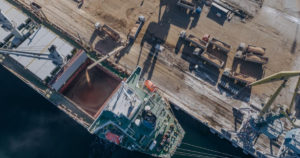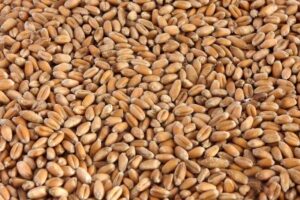
Hesburger, the largest fast food chain in Finland, plans to invest more than EUR12 million in at least 10 new restaurants in the western regions of Ukraine over the next 5 years, the Ministry of Agrarian Policy and Food has announced.
According to the report, Deputy Minister of Agrarian Policy and Food of Ukraine Oksana Osmachko discussed further ways of developing cooperation between Ukraine and Finland with Janne Harjunpaa, CEO of the Eastoffice of Finnish Industries, and Wanda Zamitska-Bergendale, CEO of Hesburger Ukraine.
“In March 2025, Hesburger made an investment of EUR 7.3 million, opening a production and warehouse complex for the production of cutlets and storage of products near Kyiv. The facility’s capacity is up to 6 tons of meat per day, and the expected volume is to serve up to 50 restaurants. Ten new jobs have been created,” the ministry said, adding that this initiative was the first Finnish industrial investment in Ukraine since the beginning of the full-scale war.
The East Office of Finnish Industries is the official representative office of Finnish business, which serves as a coordination platform for leading Finnish companies to promote their interests, develop business ties and create a favorable environment for investment and commercial activities.
Among the main members of East Office are Kone, Wärtsilä, Fortum, Neste, Outokumpu, Valmet, Orion, Tikkurila, Metso and other key players in the Finnish economy. The total annual turnover of all participating companies is about EUR 50 billion.
The Finnish company Hesburger was founded by Heikki Salmela and his wife Kirsti Salmela and started its fast food business in 1966 in the town of Naantali.
Hesburger currently operates in nine countries and has more than 480 restaurants, including 269 in Finland, 64 in Lithuania, 53 in Estonia, 53 in Latvia, 32 in Bulgaria, two in Germany and one in Poland. In Ukraine, Hesburger currently has seven locations in Kyiv and Kyiv region.
In Finland, Hesburger employs more than 6 thousand people, while the total number of employees in the chain exceeds 9.1 thousand.

Prices for apartments in Odesa showed the largest growth in the primary housing market of Ukraine in the first half of 2025 – up to $1130 per square meter, which is 19% more than in the same period last year, according to the real estate portal LUN.
According to LUN’s analytical data, the top five cities where prices for new buildings rose the most in January-March 2025 also included Mykolaiv (+8%, to $700/sq m), Ternopil (+7%, to $740/sq m), Chernihiv (+7%, to $750/sq m) and Lutsk (+7%, to $930/sq m).
At the beginning of July, Lviv remained the most expensive city in terms of price per square meter ($1370 per square meter), where the price in June 2025 increased by an average of 2% compared to June 2024 and by 5% since the beginning of the year. In the Lviv region, prices increased by 10% and 6%, respectively, to $890 per square meter.
Apartments in new buildings in Kyiv increased in price by 3% compared to June 2024 and 2% since the beginning of the year and reached $1290 per square meter. In the Kyiv region, prices have increased by 8% since the beginning of the year, to $820 per square meter.
Ivano-Frankivsk showed an increase of 10% in June-2025 to June-2024 and 3% for six months, reaching $850/sq. m. At the same time, in Ivano-Frankivsk region, apartments in new buildings went up by 19%, and by 9% in six months, to $880 per square meter.
“LUN notes that in Dnipro, prices for new buildings remained almost unchanged year-on-year: “plus” 1% in June 2025 to June 2024, but “minus” 1% by January 2025 – to $1070/sq. m. The situation in Kharkiv is similar: “minus” 5% by June-2024 and “plus” 5% by January-2025 – $660/sq. m.

Almost 5,000 vessels have handled over 130 million tons of cargo, including 80 million tons of grain, since the launch of the Ukrainian corridor in the Black Sea, said Oleksandr Semyryga, head of the Ukrainian Sea Ports Authority (USPA), during a visit to Odesa seaport by German Federal Foreign Minister Johannes Wadefuhl and Ukrainian Foreign Minister Andriy Sybiga.
“Since the launch of the Ukrainian Corridor, almost 5 thousand vessels have been handled and over 130 million tons of cargo have been transshipped. Of these, more than 80 million tons are grain. The port infrastructure is constantly under enemy attack, with shelling taking place every week. But every employee in the industry understands the importance of their work and the role that Ukrainian ports play in maintaining global food and logistics security,” Semyryga was quoted as saying by the USPA press service.
The ministers also inspected the building of the Odesa Sea Port, which was damaged by a Russian missile strike in September 2023. Semyryga clarified that the attacks are systemic – since July 2023 alone, more than 80 attacks on port infrastructure facilities in Odesa region have been recorded.

On July 19, 2025, the UKRNAFTA filling station in Lviv will host a hot dog festival, during which a national record is planned to be set. Together with the street food brand Mr.Grill, the organizers plan to cook 1000 hot dogs in one hour.
The record will be recorded by representatives of the National Register of Records of Ukraine in the nomination: “The largest number of hot dogs cooked at a filling station in 60 minutes”.
The festival will take place at the following address:
м. Lviv, 300 Shevchenka St. (territory of the UKRNAFTA filling station).
The event starts at 12:00.
The slogan of the event: “Grab the summer by the hot dog!”
After the record is officially set, all the hot dogs will be distributed free of charge among the festival visitors.
The event will also feature a rich entertainment program, including:
Special activities have been prepared for children:
Official rules of the campaign are available here .
UKRNAFTA and its partners invite Lviv residents and guests to spend the day off together, bring their families, witness the record setting and generally join the festive atmosphere.
“Ukrnafta is the largest oil company in Ukraine and the operator of the national network of filling stations. In March 2024, the company took over the management of Glusco’s assets and operates a total of 545 filling stations – 461 owned and 84 managed.
The company is implementing a comprehensive program to restore operations and update the format of its filling stations. Since February 2023, the company has been issuing its own fuel coupons and NAFTAKarta cards, which are sold to legal entities and individuals through Ukrnafta-Postach LLC.
Ukrnafta’s largest shareholder is Naftogaz of Ukraine with a 50%+1 share.
In November 2022, the Supreme Commander-in-Chief of the Armed Forces of Ukraine decided to transfer to the state a share of corporate rights of the company owned by private owners, which is now managed by the Ministry of Defense.

Ukraine’s winter wheat harvesting campaign has started, with initial yields still at a low level, according to the analytical cooperative Pusk, created within the Ukrainian Agrarian Council (UAC).
“The first results are not impressive yet – the average yield is about 2.1-2.15 tons/ha. But this is only the beginning of the campaign, and under favorable weather conditions we expect the average to increase,” the analysts said.
They emphasized that the weather conditions remain favorable for the harvesting, as no precipitation is expected this week and next week, so the field works will continue without any delays.
“However, on the grain market, traders are currently focused on barley and rapeseed. According to forecasts, ships with wheat are expected to start entering ports on July 15-18, so the market is still relatively calm,” the experts said.
According to their information, wheat prices are currently fluctuating around $210/ton for the third class on a CPT-port basis. Analysts expect a gradual increase to $230-240/ton in the fall, and the price peak may occur in December-February, when the price may reach $250-260/ton.
The global market is also showing signs of supply reduction.
“The US and Russia, as key exporters, have serious problems with the harvest. This creates the potential for further growth in world prices. If the losses are confirmed, we may see $230-240 per ton in August-September,” Pusk predicts.

“DTEK Energy has invested UAH 2.9 billion of its own funds in Ukrainian mines since the beginning of 2025, the company said in a press release.
“The invested funds allow us to maintain the fuel reserves necessary for the operation of thermal generation, as well as to continue intensive preparations for the winter,” the operating holding said.
Since the beginning of this year, DTEK Energy miners have put seven new coal faces into operation.
“We maintain a high level of investment in our coal mining enterprises to ensure the rhythmic operation of mines and coal production. We need to be sure that our generating facilities have enough fuel to cover the summer peaks in electricity consumption and the upcoming heating season,” said DTEK Energy CEO Aleksandr Fomenko.
Since the beginning of the full-scale invasion, the company’s investments in Ukrainian coal mining have totaled over UAH 21.4 billion, which were spent on the construction and repair of capital mine workings, completion of coal faces, mine tunnelling equipment, underground mine transport and production capacity support projects.
“DTEK Energy provides a closed cycle of electricity generation from coal. The company’s installed capacity in thermal generation amounted to 13.3 GW as of January 2022. The company has established a full production cycle in coal mining: coal mining and enrichment, mechanical engineering and maintenance of mine equipment.